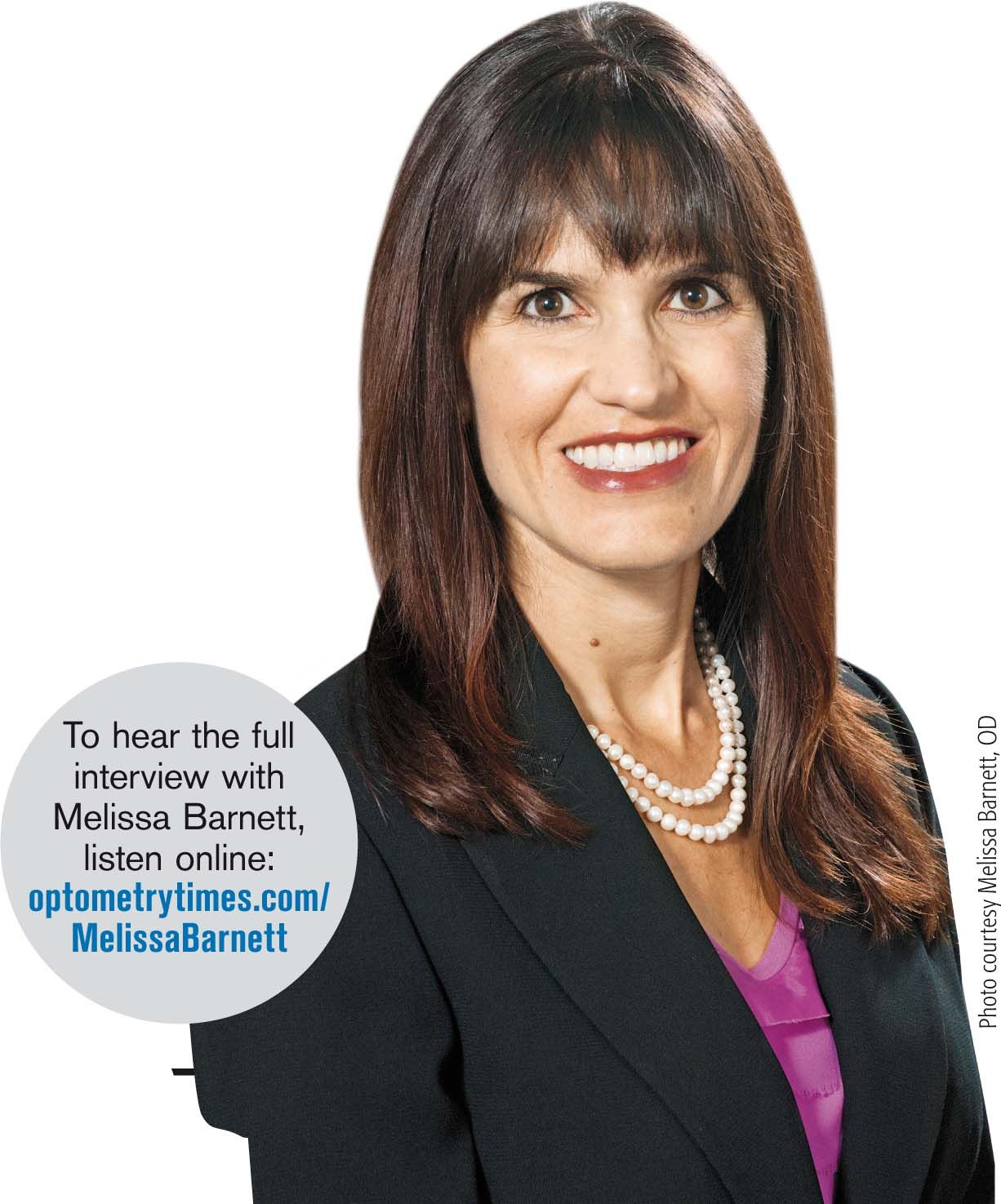Q&A: Melissa Barnett, OD, FAAO
I wore glasses and contact lenses as a child, and my optometrist who I grew up with was very inspiring. He was the one who mentioned the profession to start with and guided me along the way. Now the fun thing is that I was able to reconnect with him just last year in a professional setting. He and I both do specialty contact lens work, so that was really fun.

What attracted you to optometry?
I wore glasses and contact lenses as a child, and my optometrist who I grew up with was very inspiring. He was the one who mentioned the profession to start with and guided me along the way. Now the fun thing is that I was able to reconnect with him just last year in a professional setting. He and I both do specialty contact lens work, so that was really fun.
What keeps you in academia and clinical research?
I love to learn. I’m always learning something new, doing studies, doing research, and that’s why I enjoy speaking and writing, too.

Why contact lenses and dry eye?
Technology is really exciting, especially now. The technology we have now compared to years ago, even five years ago, is so much more advanced. As far as dry eye, I have a passion for dry eye and especially Sjögren's syndrome. I like that I actually can help these people who are very symptomatic, and sometimes they haven’t been helped previously. It’s rewarding to help people in both of these specialties.
Do you anticipate new complications arising from irritation and dry eye?
Yes and no. Scleral lens are actually a treatment for dry eye, so I don’t see complications there. As far as technology such as the telescope in the lens or specialized contact lenses, if the patients do get adequate training perhaps or they’re not fit correctly then there could potentially be complications with technology.
What’s one thing you would change about optometry as it stands now?
Let’s all bill appropriately. [Laughs] How we charge for our service is something we really need to change. I’d like to speak to my colleagues. It hasn’t changed with time but I think we need to enhance and promote preventative care as well, similar to dentistry, but also appropriately for our services and our time and our expertise.
What's one piece of advice you'd like to pass on to women entering the optometry field?
I think this goes to men and women. We’re fortunate in optometry to have so many different specialties that we can get into, just to find something we love-it could be binocular vision, ocular disease, contact lenses, or pediatrics. For women specifically, I would say when you have children, take time off-it’s okay, you’re going to be fine. It’s a great profession to balance; the work-life balance is really fantastic because you can have a family and have an impact on the profession as well.
What’s something your colleagues don’t know about you?
Some of my colleagues don’t know that I love yoga. Absolutely love it. It keeps me sane. I think it’s the mediation aspect of it, the deep breathing and concentration. I’ve been doing yoga for many, many years, and it’s something I include in my weekly routine.
What are the pros and cons of being married to another optometrist?
[Laughs] Yes, the toilet seat thing he definitely understands. Another pro of being married to my husband is that he’s very supportive. So, when I travel, he’ll watch the kids, and he’s been very supportive of the additional things I’ve been doing with speaking and writing. I think the cons were when we were first out of school, 14 years ago, we would talk about our days way too much. However, now that we have kids, we don’t focus on every single aspect of every patient. It’s all good. [Laughs]
What are the fundamental features of balanced work and home life for women in optometry?
Time management. Having kids makes me actually more efficient. When I have a snippet of time, I can work on a project. I am quite organized so that I can work on projects in the little snippets of time. I don’t have the luxury of having many hours at a time, most of the time, to work on these. And I get the whole family involved. The kids understand what I’m doing. We talk about it as a family, and I think they’re more understanding and supportive because they know what I’m doing. I have lists of what is planned for the day, my goals of what I want to accomplish each day. Sometimes not everything gets done, but I find when I actually write it down, more gets done compared to not writing it down.
What’s the craziest thing you’ve ever done?
Traveling-going across the country and coming back in one day. [Laughs] It was a very early flight on the way out and a late flight on the way back. The reason for that was to be home for the kids and the family. It was to speak and then come right back. I’ve actually done that craziness a few times. I went to London for the weekend. It was Thanksgiving. I celebrated Thanksgiving in London just for fun because that was the year after I lived in London. It was fun because it was an American Thanksgiving in London.
Newsletter
Want more insights like this? Subscribe to Optometry Times and get clinical pearls and practice tips delivered straight to your inbox.